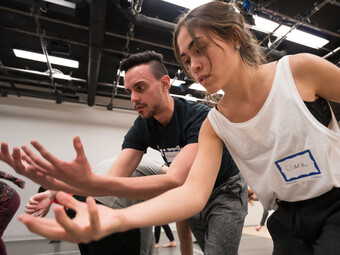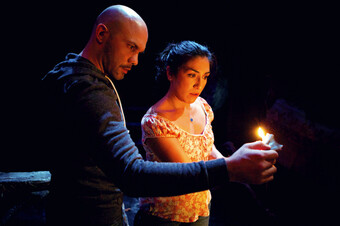Taking the Temperature
Student Access to Latina/o Plays
In preparation for the upcoming Latinx Theatre Commons National Convening, the Steering Committee asked the participants to weigh in on a few questions about the state of Latina/o theater. This is the second of three blogs detailing some of the participant responses.
How are we supporting student access to plays? According to your experiences as a student and/or professor, are Latina/o plays, history, and/or aesthetics being taught? What challenges or opportunities exist for educators?
“Usually, [Latina/o work] is never taught as part of 'mainstream' American drama, and although three Pulitzers (Dante, Cruz, and Hudes) may change this, it seems quite a long, long road still. The black/white paradigm dominates US theater.”
“The problem I find is that my drama students have placed them on the margins. My Latina/o Theater course regularly draws a large enrollment, but very few of those students are actually drama majors—the folks who we are training to be future actors, directors and designers.”
“I don't know what Latina/o aesthetics are, and don't teach them, but I would love to learn! Challenges to educators (me) are tied to the number of Latina/o plays produced in a year—if the play isn't produced, I don't teach it.”
“If they are not Latina/o or have previous experience from different populations, in theatre programs around the country they don’t learn any distinctions between Chicano or Latina/o or Spanish or Latin American work. I find with my own colleagues they miss these distinctions, and the sense of identity for the Hispanic or Latino or international student are blurred and even worse, ignored. […] We need resources to share, theatres to produce, libraries to purchase, publishers to publish, and articles written in the literary media about the variety and range of expression available within and beyond our communities.”
“In Miami we used to have a wonderful program where theaters like Teatro Avante were able to perform for thousands of elementary, middle and high school students. A few years ago that program was cancelled.”
“In the university, the challenge seems to be fundamental, that is, one must constantly justify the use and teaching of Latina/o texts as true world literature. There is the presumption that Latina/o equals poverty, ghetto, uneducated, and therefore unworthy ideas and aesthetics. The more we are published, the better the argument for our use in theater curriculum.”
Usually, [Latina/o work] is never taught as part of 'mainstream' American drama, and although three Pulitzers (Dante, Cruz, and Hudes) may change this, it seems quite a long, long road still.
[On teaching]: “Their library had no Latina/o writers on the shelves. FYI, it was a liberal arts college thirty minutes away from New York City.”
“I have taught very little, but in the quarter that I taught at UC Davis I was shocked to find that there was only one professor of color on faculty. Latina/o students were coming to me, a temporary professor, for advice and support.”
“Latina/o playwrights are told by their agents and managers not to share their work with universities and colleges in order to maximize their chances of getting a production with a regional theater. My biggest gripe is that Latina/o playwrights do not take advantage of that safe space that an academic production can provide.”
“In Arizona, the state passed a law to make it illegal to teach Latina/o literature.* Seems like fear of change, of challenging who is included in the term 'American' is the biggest challenge.”
“I was brought out by a theater from my department one semester to direct Lorca in a Green Dress for a main stage student production in 2009. What a shock! Used to working as co-director on a number of Latina/o community actors, I had grown used to their willingness toward experimentation and physical theater. The university student actors were totally unprepared for this abstract sort of piece. Trained in realism for the stage, TV and film, they lacked the physical and psychological vocabulary to imagine themselves in Nilo Cruz's surreal world.”
“I asked Juliette Carrillo to go with me to Sam French on Sunset Blvd. We wandered the store, but couldn't find any Latino texts. We asked the clerk. He directed us to the back of the store, to a small side room. To the bottom shelf of the wall. Crouched down on our knees and in a dusty, small, poorly-lit room—we looked at the small shelf of what was labeled 'Latina/Latino.' It was so sad and pathetic, I remember we pouted, snapped an iPhoto pic and texted it to Octavio Solis. I think he texted back 'LOL.' That's what the theater world feels like to me right now for Latino artists. A small, sad, fluorescent light-lit closet that nobody shops in, but there's me and Juliette smacked down to our asses on the floor by the clerk—meanwhile everyone is enjoying the large, pretty store out front. I must admit, I feel guilty when I teach theater at LA public schools to students who are coming to our matinees. I know we are building the future audiences of America. But inside, I feel like leading lambs to slaughter just a bit. If I am truthful with myself, I know that these students will never see or hear or recognize themselves on our national stages. Yet, I'm selling them a bill of goods. I'm telling them to come to the theater, spend the money you will work hard to earn one day on tickets. Why? Because this ancient craft and tradition of storytelling belongs to them, it's for them and they can/should participate. It's such a lie. Am I a complete fraud? Am I complicit? I think I am. At some point, I'm going to have to come clean.”
***
* Arizona’s “HB 2281 prohibits a school district or charter school from including courses or classes that either promote the overthrow of the United States government or promote resentment toward a race or class of people” and/or “are designed primarily for pupils of a particular ethnic group” and/or “advocate ethnic solidarity instead of the treatment of pupils as individuals.”















Comments
The article is just the start of the conversation—we want to know what you think about this subject, too! HowlRound is a space for knowledge-sharing, and we welcome spirited, thoughtful, and on-topic dialogue. Find our full comments policy here
I am a teacher of culture studies. My students buy their plays at sam french store. We look at it as a culture field trip and have had a many experiences buying plays for our classes. We have always walked away with new ideas and theatre to produce.
This is such interesting information and a lot of it rings true for me. I graduated from a great theatre program in upstate NY, but only read a few plays written by Latina/o playwrights while there, and definitely didn't learn about many distinctions "between Chicano or Latina/o or Spanish or Latin American work," as someone in this article says. Now I actively seek out plays by Latina/o playwrights but often have trouble finding them in libraries, where I find a lot of the plays I read. It's frustrating. I wish I could go back and take (or offer) a course on what I'd now like to learn. A Survey of Latina/o Playwrighting, perhaps? Sounds good to me. Anyway, I'm so glad this conversation is happening and I'm looking forward to learning more as it continues. Please let me know if there's anything non-Latina/o artists can do to support the upcoming National Convening and the movement as a whole!